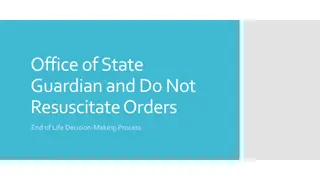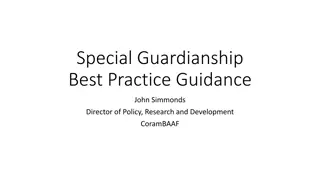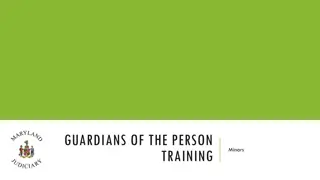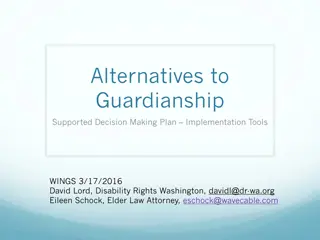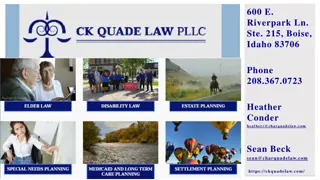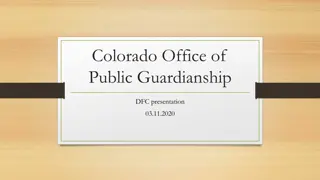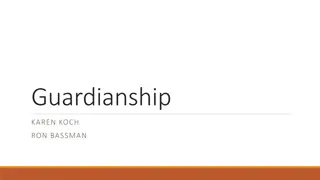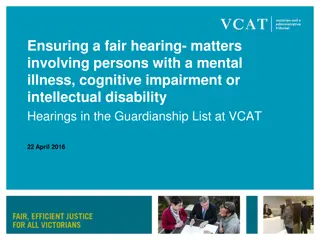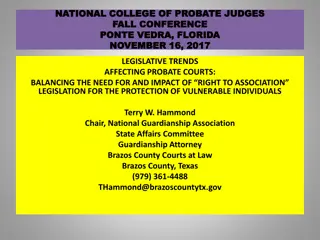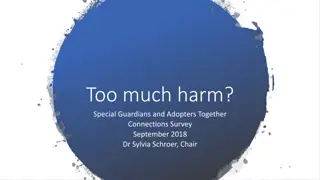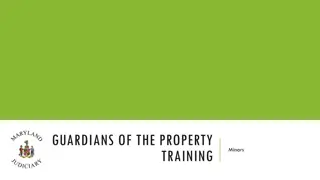
Guardianship and Alternatives in South Dakota
Learn about the implications of turning 18, options available in South Dakota, differences between guardianship and conservatorship, duties of guardians/conservators, and alternatives to guardianship such as supported decision-making, conservatorship, and power of attorney.
Download Presentation

Please find below an Image/Link to download the presentation.
The content on the website is provided AS IS for your information and personal use only. It may not be sold, licensed, or shared on other websites without obtaining consent from the author. If you encounter any issues during the download, it is possible that the publisher has removed the file from their server.
You are allowed to download the files provided on this website for personal or commercial use, subject to the condition that they are used lawfully. All files are the property of their respective owners.
The content on the website is provided AS IS for your information and personal use only. It may not be sold, licensed, or shared on other websites without obtaining consent from the author.
E N D
Presentation Transcript
GUARDIANSHIP AND ALTERNATIVES TO IT (INFORMATION ABOUT GUARDIANSHIP THAT YOU WANT BUT ARE AFRAID TO ASK FOR) Presenter: Disability Rights South Dakota
What happens when a child turns 18 years old? Upon turning age 18, all children including children with disabilities - legally are considered an adult. For children with disabilities, this also means that there is a transfer of rights from parent to child. All parental rights, and responsibilities, that are part of the IEP (Individualized Education Program) process transfer from parent to child, including right to notice, right to procedural safeguards under IDEA (Individuals with Disabilities Education Act), and advocating for their educational needs. The school district, through the IEP Team, is to notify both the child/individual and the parents of the transfer of rights. In South Dakota, this is to occur no later than one year prior to reaching the age of majority, or on or before the 17thbirthday.
What options are available in South Dakota? Guardianship Supported Decision Making (through informal processes) Conservatorship Power of Attorney
Guardianship and Conservatorship Conservatorship Guardianship Legal relationship (established by the court) Full: May encompass all personal affairs of the individual Limited: Guardian has authority only over selected areas of the individual's affairs Temporary: Guardianship is established for a limited time frame Joint: More than one person is appointed to be guardian Legal relationship (established by the court) Limited to management of property and financial affairs Can be Full, Limited, Temporary, or Joint
Duties of Guardian or Conservator Must maintain contact with the protected person to become familiar with their needs and limitations, and only exercise their decision-making authority to the extent required by those limitations. Must respect the fact that their relationship with the protected person is a confidential one and should encourage the person s participation in decision- making to the extent possible. Provide required information to the court, including information pertaining to the protected person s finances and personal inventory, as well as an annual personal status report.
Power of Attorney Power of attorney (POA) can be considered as an option if the person has the ability to understand and sign contracts but needs assistance in certain areas of decision making and may need someone to be able to sign documents on their behalf for those purposes. Most common powers of attorney are for financial affairs or health care matters. Individual must be at least least 18 years of age to enter a POA agreement.
Types of Power of Attorney Durable Remains valid and in effect even if individual becomes incapacitated and unable to make decisions for themself Non-Durable Authorizes a person or persons to act on behalf of an individual Can be granted verbally but better if it is in writing Sets in writing a person's authority to make decisions on an individual's behalf even if they are incapacitated Ends if individual who granted POA becomes incapacitated Can take effect immediately or upon individual becoming incapacitated Should be drafted by an attorney
Revoking Power of Attorney Both durable and non-durable power of attorney can be revoked. Durable power of attorney must be revoked before individual becomes incapacitated (unable to make decisions on their own). Non-durable power of attorney can be revoked at any time by individual who granted it, and it is automatically revoked if individual becomes incapacitated. Both durable and non-durable power of attorney are terminated if either the individual giving, or person given power of attorney pass away.
Supported Decision Making The process of assisting a person with a disability to make their own decisions. Allows them to develop and pursue their own goals, make choices about their life, and exercise some control over the things that are important to them. Can be used in both the educational context and for adults with disabilities. Provides for a team approach to decision making. Allows the person with a disability to choose who he or she wants on his or her Supported Decision Making team. In addition to the person being supported, the team may be one person or several, based on the needs and desires of the individual. Each team member might have a specific area where they provide support.
Is Supported Decision Making recognized by the State of South Dakota? At this time South Dakota does not formally recognize Supported Decision Making (SDM) in the statutes. However, South Dakota does recognize power of attorney agreements, which can be used as part of the SDM process.
Margaret Jean "Jenny" Hatch In 2012, Margaret Jean Jenny Hatch was a 28-year-old woman with Down Syndrome, with an IQ of approximately 50. She had been living independently and working at a local thrift shop. Jenny was immobilized after being hit by a car while on her bicycle and required surgery. She had revoked her parents power of attorney over her for they wanted her placed in a group home. In August of 2012, her parents filed a Petition seeking to place Jenny in a full guardianship, including the authority to decide where she would live and whether to give or withhold medical treatment. Shortly thereafter, the Court held a hearing and put Jenny in a temporary guardianship, taking away her right to make any decisions about her life. As a result, Jenny was placed in a group home where they took away her cell phone and laptop and wouldn t let her see her friends.
Jenny Hatch cont. Attorney Jonathan Martinis and his legal team entered Jenny s case in February of 2013. On August 2, 2013, after a year of litigation and six days of trial, Jenny Hatch won the right to make decisions for herself, using Supported Decision Making: to direct her life to the maximum of her abilities and choose where to live, what to do and who to see. The Court recognized the requirement to give deference to Jenny s preferences. Jenny Hatch s case was the first time a court in the United States recognized Supported Decision Making, which was previously introduced in Canada.
Credits, Sources, and Resources 34 CFR 300.520(a) (Transfer of Rights Federal) Administrative Rules of South Dakota (ARSD) 24:05:30:16.01 (Transfer of Rights South Dakota) ARSD 24:05:27:01.03 (Timing of the Notice of Transfer of Rights South Dakota) Technical Assistance Guide for Transfer in the IEP, updated July 2016, https://doe.sd.gov/sped/documents/TA-Guide.doc https://doe.sd.gov/sped/IEP.aspx http://jennyhatchjusticeproject.org/ http://www.wavy.com/news/special-report-justice-for-jenny
Credits, Sources, and Resources, cont. South Dakota Guardianship and Conservatorship Act, South Dakota Codified Law (SDCL) 29A-5-101 et al. http://dhs.sd.gov/guardianship/guardianshipandconservatorshipfaqs.aspx http://dhs.sd.gov/guardianship/ http://ujs.sd.gov/Forms/guardianship.aspx http://ujslawhelp.sd.gov/guardianship.aspx https://southdakota.tylerhost.net/SRL/SRL/ExecuteInterview Agency Act (for Power of Attorney), SDCL Title 59
Credits, Sources, and Resources, cont. Supported Decision-Making An Alternative to Guardianship by John Hamilton, Legal Affairs Director, Disability Rights South Dakota (DRSD), http://dhs.sd.gov/docs/Supported%20Decision- Making%20Article,%20SDR%20March%202018.pdf https://www.aclu.org/ https://www.aclu.org/other/supported-decision-making-resource-library https://www.aclu.org/sites/default/files/field_document/aclu_supported_decision- making_agreement.pdf http://supporteddecisionmaking.org/ http://supporteddecisionmaking.org/content/resource-library http://supporteddecisionmaking.org/sites/default/files/aclu-qt-sdm-agreement.pdf
Contact us! Disability Rights South Dakota 800-658-4782 Voice/TTY 605-224-8294 phone 605-224-5125 fax www.drsdlaw.org drsd@drsdlaw.org Corporate Mailing: 2520 E Franklin St Ste 2 Pierre, SD 57501


